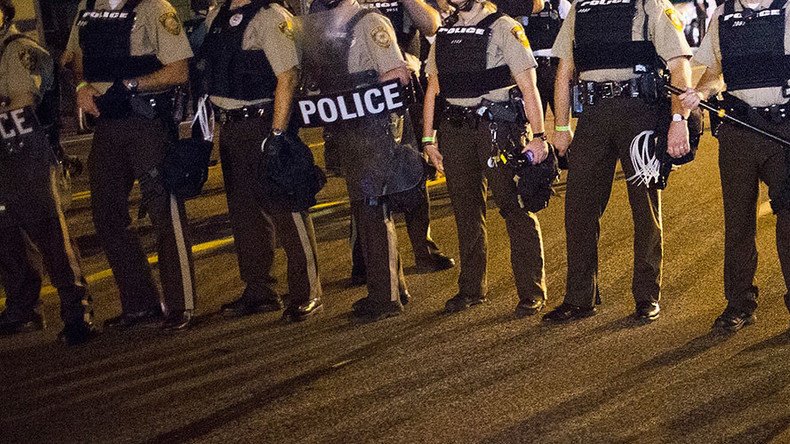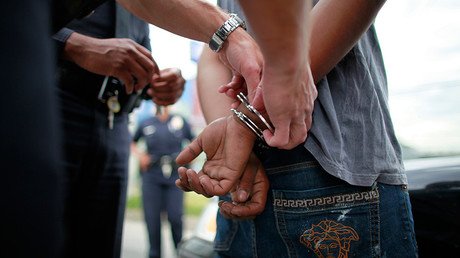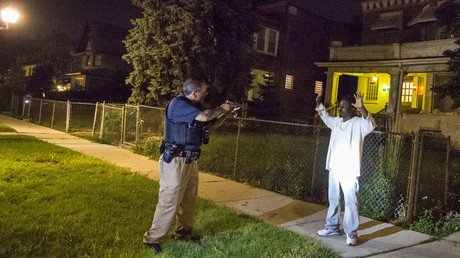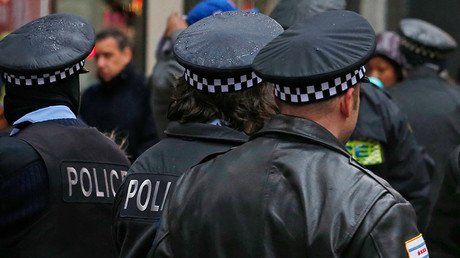Ferguson City Council accepts DoJ-ordered police reforms

Ferguson, Missouri has approved a police-reform deal negotiated with the US Department of Justice (DoJ). The effort to overhaul the city’s policing practices stems from the 2014 police killing of unarmed teen Michael Brown.
On Tuesday, the Ferguson City Council unanimously approved the deal it had reached with the federal government after months of negotiations. The agreement was released to the public in late January. Two weeks later, the Ferguson City Council voted to change the agreement in an effort to cope with costs of implementing reform. The DoJ then immediately sued the city for "unilaterally" amending the negotiated agreement.
The city reversed its defiance to the original deal once the DoJ explained that costs associated with reform will not be as high as Ferguson's finance director had projected. This reversal led to Tuesday's vote. The entire council, minus an absent member, voted for the deal.
“Tonight, the city of Ferguson, Missouri, took an important step towards guaranteeing all of its citizens the protections of our Constitution,” Vanita Gupta, head of the DoJ’s Civil Rights Division, said in a statement on Tuesday. “We are pleased that they have approved the consent decree, a document designed to provide the framework needed to institute constitutional policing in Ferguson, and look forward to filing it in court in the coming days and beginning to work with them towards implementation.”
The agreement, first sent to Ferguson on January 26, requires hiring a monitor, instituting police diversity training, and spending money on software and staff to keep track and analyze information on arrests, use of force incidents, and other police matters. The agreement also lays out a plan to revise Ferguson’s Municipal Code. This includes repealing penalties for failure to appear upon arrest or summons, as well as repealing an authorizing fee for the withdrawal of a complaint.
While the city debated and negotiated police reforms, local residents and activists were clear about their anger and frustration. Yet on Tuesday, the council's decision to accept the deal was greeted with cheers and a hug between Ferguson Mayor James Knowles III and Michael Brown Sr., father of Michael Brown, the unarmed black teenager who was fatally shot in August 2014 by a white Ferguson police officer. The shooting led to fierce protests in Ferguson and the DoJ's investigation into the city's policing and judicial practices.
“This is Mike Brown’s legacy,” said Brown Sr. of his son, according to the St. Louis Post-Dispatch.
Michael Brown Sr, #Mikebrown father shakes with #ferguson Mayor Knowles after council accepted #DOJ consent decree pic.twitter.com/ppGpvFH6TL
— Christian Gooden (@pd_shutterspeed) March 16, 2016
The city council softened its opposition to the deal once the DoJ rebutted cost figures the city projected for implementing the reform deal. The city now believes costs will be between $1 million and $1.5 million in the first year, up to $882,300 in the second year, and up to $754,350 in the third year, according to the Post-Dispatch. The city is expected to follow the agreement for three to five years.
Almost 1,200 people, mostly minorities, killed by US cops in 2015 https://t.co/LZXS7hmot1pic.twitter.com/1E9sXW7gpq
— RT (@RT_com) January 3, 2016
Knowles said the city, with a $2.8-million budget deficit, must seek an economic development sales tax and property tax increase, both of which will be on the ballot in April, to cover the costs.
“Without passing this tax increase, it will be nearly impossible to meet the terms of that decree,” Knowles said. The city has a $14.5 million operating budget, the Post-Dispatch reported.
The reform deal followed a report issued by the DoJ on on March 4, 2015, in regard to findings concerning the Ferguson Police Department. The DoJ found a pattern of unconstitutional behavior in the Ferguson PD, noting that while African-Americans represented 67 percent of Ferguson’s population, they accounted for 90 percent of traffic stops and arrests. The government also found that Ferguson police officers have routinely detained and arrested residents without probable cause or suspicion, and have all too frequently resorted to using excessive force.
Stop eroding faith in gov’t: DOJ warns courts about fining & jailing poor people https://t.co/V5K43Xutmmpic.twitter.com/6dD9NGFztE
— RT America (@RT_America) March 14, 2016
In addition, the Justice Department found “derogatory and dehumanizing” emails that had been sent during the workday from official police department and court officer accounts depicting President Barack Obama as a chimpanzee, and First Lady Michelle Obama's "high school reunion" as a photo of African tribal women.
The report came seven months after Brown’s death. Its release ignited a firestorm of criticism directed at law enforcement, local and otherwise. On the same day the report was made public, the DoJ announced that, as a result of a separate investigation, authorities would not charge the shooter, former Officer Darren Wilson, with civil rights violations related to the incident. A St. Louis County grand jury had previously declined to indict Wilson for Brown’s death.














